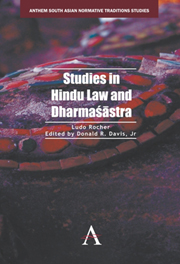Book contents
- Frontmatter
- Contents
- Foreword by Richard W. Lariviere
- Preface
- Abbreviations
- Note on the Edition
- Introduction
- PART ONE THE NATURE OF HINDU LAW
- Hindu Conceptions of Law
- The Historical Foundations of Ancient Indian Law
- Hindu Law and Religion: Where to Draw the Line
- Law Books in an Oral Culture: The Indian Dharmaśūstras
- Schools of Hindu Law
- Changing Patterns of Diversification in Hindu Law
- PART TWO GENERAL TOPICS OF HINDU LAW
- PART THREE HINDU LEGAL PROCEDURE
- PART FOUR TECHNICAL STUDIES OF HINDU LAW
- PART FIVE ANGLO-HINDU AND CUSTOMARY LAW
- Bibliography
- Index
Law Books in an Oral Culture: The Indian Dharmaśūstras
from PART ONE - THE NATURE OF HINDU LAW
Published online by Cambridge University Press: 05 February 2013
- Frontmatter
- Contents
- Foreword by Richard W. Lariviere
- Preface
- Abbreviations
- Note on the Edition
- Introduction
- PART ONE THE NATURE OF HINDU LAW
- Hindu Conceptions of Law
- The Historical Foundations of Ancient Indian Law
- Hindu Law and Religion: Where to Draw the Line
- Law Books in an Oral Culture: The Indian Dharmaśūstras
- Schools of Hindu Law
- Changing Patterns of Diversification in Hindu Law
- PART TWO GENERAL TOPICS OF HINDU LAW
- PART THREE HINDU LEGAL PROCEDURE
- PART FOUR TECHNICAL STUDIES OF HINDU LAW
- PART FIVE ANGLO-HINDU AND CUSTOMARY LAW
- Bibliography
- Index
Summary
In 1772 the British authorities in Calcutta decided that, to be fair to the Indians, they should administer to them not British laws, which the Indians did not know and would not understand, but the local Hindu and Muslim laws, which they not only understood but had held in high esteem for centuries.
A fair, humane decision it was; a practical, easy decision it was not. The difficulty was not so much with the Muslims: they had the Quran and the Sharia, and many of the Englishmen who were to administer law to them knew Persian, some even Arabic. The problem was with the Hindus. They too, had law books, but these were in Sanskrit, and of that language no Englishman had any notion whatever.
I will pass over the early British solutions to that problem, since they are not relevant to the point I wish to make. I will just note that, after a few years, some courageous Englishmen came to the conclusion that there was only one way to do it right: they had to learn Sanskrit. That and only that would enable them to read the original texts of the Sanskrit law books, without having to depend on intermediaries, pandits, whom they no longer trusted.
The British were told that the laws of the Hindus were contained in books called Dharmaśāstras, i.e., śāstras “texts, treatises” on dharma “the aggregate of all the rules which a Hindu is supposed to live by.” The British also learned that the Dharmaśāstra the Hindus most highly respected was the one attributed to Manu, one of the several ancient sages who are supposed to have composed —rather, “revealed”— treatises on dharma.
- Type
- Chapter
- Information
- Studies in Hindu Law and Dharmasastra , pp. 103 - 118Publisher: Anthem PressPrint publication year: 2012



